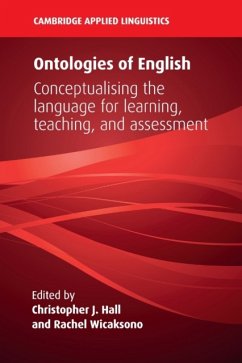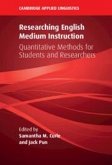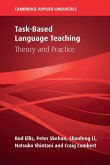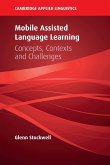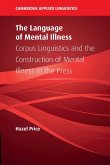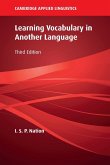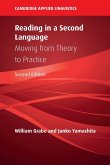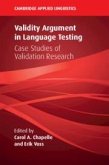Ontologies of English
Herausgeber: Hall, Christopher J.; Wicaksono, Rachel
Ontologies of English
Herausgeber: Hall, Christopher J.; Wicaksono, Rachel
- Broschiertes Buch
- Merkliste
- Auf die Merkliste
- Bewerten Bewerten
- Teilen
- Produkt teilen
- Produkterinnerung
- Produkterinnerung
A critical examination of the ways in which English is conceptualised for learning, teaching, and assessment in a range of domains, from both social and cognitive perspectives. Researchers and postgraduates working on English in L1 and L2 educational contexts will find it valuable for research and collaboration.
Andere Kunden interessierten sich auch für
![Researching English Medium Instruction Researching English Medium Instruction]() Researching English Medium Instruction46,99 €
Researching English Medium Instruction46,99 €![Task-Based Language Teaching Task-Based Language Teaching]() Rod Ellis (University of Auckland)Task-Based Language Teaching44,99 €
Rod Ellis (University of Auckland)Task-Based Language Teaching44,99 €![Mobile Assisted Language Learning Mobile Assisted Language Learning]() Glenn Stockwell (Japan Waseda University)Mobile Assisted Language Learning39,99 €
Glenn Stockwell (Japan Waseda University)Mobile Assisted Language Learning39,99 €![The Language of Mental Illness The Language of Mental Illness]() Hazel Price (University of Salford)The Language of Mental Illness45,99 €
Hazel Price (University of Salford)The Language of Mental Illness45,99 €![Learning Vocabulary in Another Language Learning Vocabulary in Another Language]() I. S. P. Nation (Victoria University of Wellington)Learning Vocabulary in Another Language57,99 €
I. S. P. Nation (Victoria University of Wellington)Learning Vocabulary in Another Language57,99 €![Reading in a Second Language Reading in a Second Language]() William Grabe (Northern Arizona University)Reading in a Second Language46,99 €
William Grabe (Northern Arizona University)Reading in a Second Language46,99 €![Validity Argument in Language Testing Validity Argument in Language Testing]() Validity Argument in Language Testing47,99 €
Validity Argument in Language Testing47,99 €-
-
-
A critical examination of the ways in which English is conceptualised for learning, teaching, and assessment in a range of domains, from both social and cognitive perspectives. Researchers and postgraduates working on English in L1 and L2 educational contexts will find it valuable for research and collaboration.
Hinweis: Dieser Artikel kann nur an eine deutsche Lieferadresse ausgeliefert werden.
Hinweis: Dieser Artikel kann nur an eine deutsche Lieferadresse ausgeliefert werden.
Produktdetails
- Produktdetails
- Cambridge Applied Linguistics
- Verlag: Cambridge University Press
- Seitenzahl: 404
- Erscheinungstermin: 10. März 2022
- Englisch
- Abmessung: 229mm x 152mm x 22mm
- Gewicht: 586g
- ISBN-13: 9781108710633
- ISBN-10: 1108710638
- Artikelnr.: 63266161
- Herstellerkennzeichnung
- Produktsicherheitsverantwortliche/r
- Europaallee 1
- 36244 Bad Hersfeld
- gpsr@libri.de
- Cambridge Applied Linguistics
- Verlag: Cambridge University Press
- Seitenzahl: 404
- Erscheinungstermin: 10. März 2022
- Englisch
- Abmessung: 229mm x 152mm x 22mm
- Gewicht: 586g
- ISBN-13: 9781108710633
- ISBN-10: 1108710638
- Artikelnr.: 63266161
- Herstellerkennzeichnung
- Produktsicherheitsverantwortliche/r
- Europaallee 1
- 36244 Bad Hersfeld
- gpsr@libri.de
Part I. Introduction: 1. Approaching ontologies of English Christopher J.
Hall and Rachel Wicaksono; 2. An ontological framework for English
Christopher J. Hall; Part II. English In/For L2 Learning and Teaching: 3.
English in the real world: norms and the ontology of English(es) Peter
Harder; 4. From constructions to social action: the substance of English
and its learning from an interactional usage-based perspective Søren Wind
Eskildsen; 5. Native and non-native speakers of English Rachel Wicaksono;
Part III. English In Schools: 6. The origins and adaptations of English as
a school subject Andy Goodwyn; 7. A 'God-like science': English teaching in
Secondary schools Rachel Roberts; 8. Beliefs about 'good English' in
schools Clare Cunningham; Part IV. Assessing English: 9. English varieties
and targets for L2 assessment Claudia Harsch; 10. The role of the L1 in
testing L2 English Fumiyo Nakatsuhara, Lynda Taylor and Suwimol Jaiyote;
11. Mind the gap: dis/continuities in the UK assessment of L1 English
language Angela Goddard; Part V. English in Lingua Franca Contexts: 12.
What is English in the light of lingua franca usage? Iris Schaller-Schwaner
and Andy Kirkpatrick; 13. English as a lingua franca and transcultural
communication: rethinking competences and pedagogy for ELT Will Baker; 14.
Exploring standards-based, intelligibility-based, and complex conceptions
of English in a lingua franca context Nathan Page; Part VI. English and
Social Practice: 15. English as a resource in a communicative assemblage: a
perspective from flat ontology Suresh Canagarajah; 16. Mobile learners and
'English as an additional language' Robert Sharples; 17. Mobility and
English language education: how does mobility in study abroad settings
produce new conceptualisations of English? Khawla Badwan; Part VII.
Commentary and Conclusions: 18. Pushing the ontological boundaries of
English Alastair Pennycook; 19. Using ontologies of English Rachel
Wicaksono and Christopher J. Hall.
Hall and Rachel Wicaksono; 2. An ontological framework for English
Christopher J. Hall; Part II. English In/For L2 Learning and Teaching: 3.
English in the real world: norms and the ontology of English(es) Peter
Harder; 4. From constructions to social action: the substance of English
and its learning from an interactional usage-based perspective Søren Wind
Eskildsen; 5. Native and non-native speakers of English Rachel Wicaksono;
Part III. English In Schools: 6. The origins and adaptations of English as
a school subject Andy Goodwyn; 7. A 'God-like science': English teaching in
Secondary schools Rachel Roberts; 8. Beliefs about 'good English' in
schools Clare Cunningham; Part IV. Assessing English: 9. English varieties
and targets for L2 assessment Claudia Harsch; 10. The role of the L1 in
testing L2 English Fumiyo Nakatsuhara, Lynda Taylor and Suwimol Jaiyote;
11. Mind the gap: dis/continuities in the UK assessment of L1 English
language Angela Goddard; Part V. English in Lingua Franca Contexts: 12.
What is English in the light of lingua franca usage? Iris Schaller-Schwaner
and Andy Kirkpatrick; 13. English as a lingua franca and transcultural
communication: rethinking competences and pedagogy for ELT Will Baker; 14.
Exploring standards-based, intelligibility-based, and complex conceptions
of English in a lingua franca context Nathan Page; Part VI. English and
Social Practice: 15. English as a resource in a communicative assemblage: a
perspective from flat ontology Suresh Canagarajah; 16. Mobile learners and
'English as an additional language' Robert Sharples; 17. Mobility and
English language education: how does mobility in study abroad settings
produce new conceptualisations of English? Khawla Badwan; Part VII.
Commentary and Conclusions: 18. Pushing the ontological boundaries of
English Alastair Pennycook; 19. Using ontologies of English Rachel
Wicaksono and Christopher J. Hall.
Part I. Introduction: 1. Approaching ontologies of English Christopher J.
Hall and Rachel Wicaksono; 2. An ontological framework for English
Christopher J. Hall; Part II. English In/For L2 Learning and Teaching: 3.
English in the real world: norms and the ontology of English(es) Peter
Harder; 4. From constructions to social action: the substance of English
and its learning from an interactional usage-based perspective Søren Wind
Eskildsen; 5. Native and non-native speakers of English Rachel Wicaksono;
Part III. English In Schools: 6. The origins and adaptations of English as
a school subject Andy Goodwyn; 7. A 'God-like science': English teaching in
Secondary schools Rachel Roberts; 8. Beliefs about 'good English' in
schools Clare Cunningham; Part IV. Assessing English: 9. English varieties
and targets for L2 assessment Claudia Harsch; 10. The role of the L1 in
testing L2 English Fumiyo Nakatsuhara, Lynda Taylor and Suwimol Jaiyote;
11. Mind the gap: dis/continuities in the UK assessment of L1 English
language Angela Goddard; Part V. English in Lingua Franca Contexts: 12.
What is English in the light of lingua franca usage? Iris Schaller-Schwaner
and Andy Kirkpatrick; 13. English as a lingua franca and transcultural
communication: rethinking competences and pedagogy for ELT Will Baker; 14.
Exploring standards-based, intelligibility-based, and complex conceptions
of English in a lingua franca context Nathan Page; Part VI. English and
Social Practice: 15. English as a resource in a communicative assemblage: a
perspective from flat ontology Suresh Canagarajah; 16. Mobile learners and
'English as an additional language' Robert Sharples; 17. Mobility and
English language education: how does mobility in study abroad settings
produce new conceptualisations of English? Khawla Badwan; Part VII.
Commentary and Conclusions: 18. Pushing the ontological boundaries of
English Alastair Pennycook; 19. Using ontologies of English Rachel
Wicaksono and Christopher J. Hall.
Hall and Rachel Wicaksono; 2. An ontological framework for English
Christopher J. Hall; Part II. English In/For L2 Learning and Teaching: 3.
English in the real world: norms and the ontology of English(es) Peter
Harder; 4. From constructions to social action: the substance of English
and its learning from an interactional usage-based perspective Søren Wind
Eskildsen; 5. Native and non-native speakers of English Rachel Wicaksono;
Part III. English In Schools: 6. The origins and adaptations of English as
a school subject Andy Goodwyn; 7. A 'God-like science': English teaching in
Secondary schools Rachel Roberts; 8. Beliefs about 'good English' in
schools Clare Cunningham; Part IV. Assessing English: 9. English varieties
and targets for L2 assessment Claudia Harsch; 10. The role of the L1 in
testing L2 English Fumiyo Nakatsuhara, Lynda Taylor and Suwimol Jaiyote;
11. Mind the gap: dis/continuities in the UK assessment of L1 English
language Angela Goddard; Part V. English in Lingua Franca Contexts: 12.
What is English in the light of lingua franca usage? Iris Schaller-Schwaner
and Andy Kirkpatrick; 13. English as a lingua franca and transcultural
communication: rethinking competences and pedagogy for ELT Will Baker; 14.
Exploring standards-based, intelligibility-based, and complex conceptions
of English in a lingua franca context Nathan Page; Part VI. English and
Social Practice: 15. English as a resource in a communicative assemblage: a
perspective from flat ontology Suresh Canagarajah; 16. Mobile learners and
'English as an additional language' Robert Sharples; 17. Mobility and
English language education: how does mobility in study abroad settings
produce new conceptualisations of English? Khawla Badwan; Part VII.
Commentary and Conclusions: 18. Pushing the ontological boundaries of
English Alastair Pennycook; 19. Using ontologies of English Rachel
Wicaksono and Christopher J. Hall.

